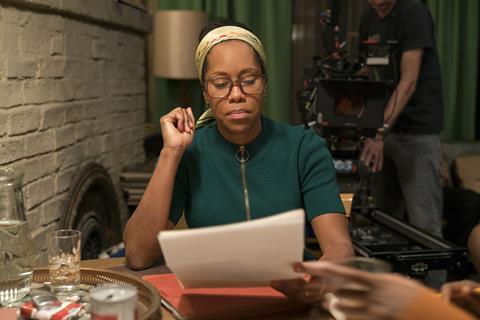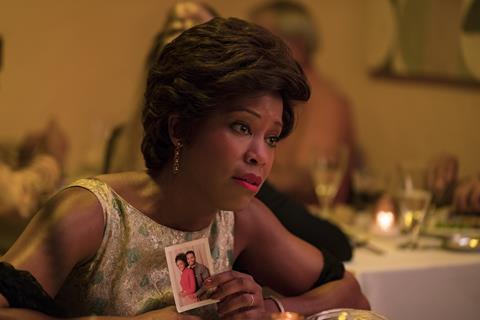As an actress working back in film after many years in prestige TV, Regina King tells Screen why she was drawn back to the big screen for If Beale Street Could Talk.

Regina King had been somewhat traumatised playing a grieving mother on Netflix’s acclaimed series Seven Seconds, and so hesitated when Barry Jenkins asked her to join his James Baldwin adaptation If Beale Street Could Talk.
Unlike her character Latrice Butler in Seven Seconds, Beale Street’s Sharon Rivers does not lose a child, but she doesn’t exactly enjoy an easy ride either as the mother of Tish, a young pregnant woman in 1970s Harlem scrambling to get her boyfriend off a wrongful rape charge.
And it is Rivers’ calmness amid the bruising reality of institutionalised racism and inter-familial animosity that makes the deepest impression. King admits she had not read Baldwin’s novel when producers Plan B set up a FaceTime chat with the writer/director, but she did her homework and discovered she and Jenkins were on the same page.
“She came across as a woman that created — a lot like Barry in many ways — this space in their home where there’s no shame,” says King, who has earned Golden Globe nominations for both Beale Street and Seven Seconds, to add to her Spirit Awards nod and New York Film Critics Circle supporting actress win for Beale Street. “She was a young mother herself, so once you cross the threshold of the Rivers’ home, it’s a safe place for anyone who ventures inside.
“Barry and I both have women in our lives that are very graceful, but they do say what’s in their heart and what’s in their mind,” says the TV and film veteran, referring to her mother, grandmother and aunt. “Both of us have grown up with those types of woman and that allowed a director and actor to have a very similar vision when it came to Sharon.” Together, they brainstormed the character to such an extent “that the first time we met we just fell into step”.
King cites the Moonlight director’s humility, patience, grace and preparedness as qualities she particularly admired. “Barry does his homework and he knows what he wants. While he does come with a plan, he makes these little discoveries and has no problem deviating from the original plan. I can relate to that as an actor in a lot of ways. When you’ve been working for a long time, you kind of have a bag of tricks, and it’s when you’ve exhausted all those tricks in the bag that the true little gems come.”

Cross-format success
King has sprinkled gems throughout her entertainment career. She broke out in Boyz N The Hood back in 1991 and went on to forge an impressive career in television, winning three Primetime Emmys and notching up credits on the likes of American Crime, The Leftovers and Southland. Seven Seconds brought a third Emmy in 2018 for King’s role as the mother of a young man accidentally killed by a police officer.
“I’m a mother of a son so I had to tap into some places and stay there for a long time and I hope I don’t ever have to go back there,” she says. “Playing this mother was terrifying and I knew if I got it wrong I would have dishonoured so many mothers out there whose children had been murdered. I needed to honour their pain as best I could and it became terrifying on another level.”
King is now shooting the Watchmen series for HBO. “I love there is no longer that line of separation [between film and TV]. I started in TV and then I started doing movies and I did movies for 10-15 years before I’d done any TV again.
“I remember the movie actor was considered more prestigious than a TV actor, so when I made the decision to go back to TV, I remember a little bit of that conversation. Now you see Julia Roberts on TV — everyone’s doing it and that divide no longer exists. I do have a sense of pride that I always let the art guide my choices, and being a mother, and land on my feet and commit to those choices.”
It has been years since she last shot a film, and King had forgotten how long it took. “I hadn’t done film, I think, in 19 years. I’d forgotten how long it takes. TV schedules are so much faster.”
The timeliness of Beale Street appealed to her. “It’s sad, but the conversations and the story being told in 1974 are the conversations and some of the stories that are being told now,” she says. “The movie needs to be seen now because people need something that’s calm like that and need to sit with these characters and need to feel this hug I feel the movie gives you.”

























No comments yet